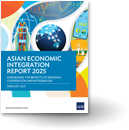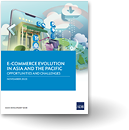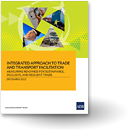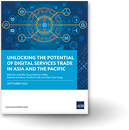ADB Climate Change Actions
While rapid economic expansion has brought immense benefits to Asia, it has adversely affected the environment. Greater production and consumption, connectivity, and flows of goods and people have created environmental degradation through air pollution and damage to protected areas, and contributed to increases in greenhouse gas emissions and climate change. ADB has responded to these challenges by integrating climate change adaptation and mitigation among its efforts, consciously melding this as an overarching theme for projects in different sectors such as agriculture, energy, transport, health, and social protection.
ADB’s work on climate change involves financing, knowledge dissemination, and building partnerships. ADB mobilizes and facilitates funding through concessional resources such as the Climate Change Fund, Climate Investment Funds, and the Global Environment Facility;private sector money including equity funds; and a number of market-based mechanisms such as the Carbon Market Program. ADB produces knowledge products (e.g., reports, papers, and background materials) to widen region-specific knowledge on the challenges and opportunities of climate change in Asia. For 2012, ADB has released 21 knowledge products on climate change, food security and price volatility, power, biodiversity, natural disasters, and climate-induced migration, among other subjects. ADB also continues to nurture strong partnerships with multilateral institutions, the private sector, and other financing facilities.
ADB’s strategic priorities for climate change include (i) more extensive use of clean energy, (ii) sustainable transport and urban development, (iii) land use and forest management for carbon sequestration, (iv) climate-resilient development, and (v) stronger policies and governance. In 2009–2011, ADB made $10 billion worth of investments through 110 projects in more than 40 countries and provided $250 million in technical assistance to developing member countries.
The climate is a global common, and actions to address climate change require coordination at different levels: global, national, sub-national, and regional. In terms of regional cooperation and integration, ADB’s support focuses on (i) regional and subregional policy dialogues and initiatives, (ii) research and information dissemination, (iii) capacity building and institutional strengthening, and (iv)regional partnership building through forums and exchange programs. Since 2009, ADB has approved 30 projects concerning RCI and climate change, and 36 technical assistance projects on climate change that are regional in scope. Some of the recently approved projects in the past 12 months include GMS core agriculture support; studies on climate change in Central and West Asia; coastal and marine management in the Coral Triangle; and wind power development in Mongolia, the Philippines, Sri Lanka, and Viet Nam.




